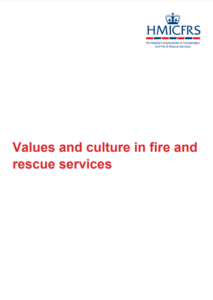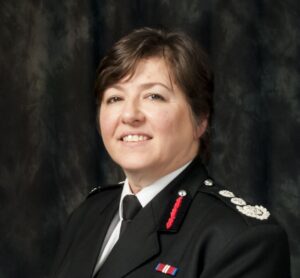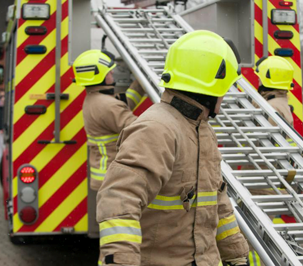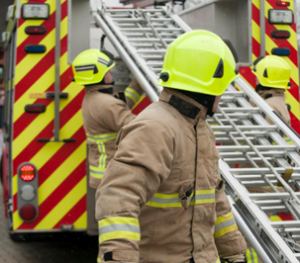Claims of bullying, harassment and discrimination were reported by staff in the fire service for Brighton and Hove, according to a new report.
His Majesty’s Inspectorate of Constabulary and Fire and Rescue Services (HMICFRS) said: “Staff reported allegations of bullying, harassment and discrimination in every fire and rescue service in England.
“And recent headlines about misconduct may be just the tip of the iceberg.”
Chief Fire Officer Dawn Whittaker, who runs East Sussex Fire and Rescue Service, said: “We already take a strong stance against bullying, harassment, and discrimination and we have a track record for addressing issues that are identified locally. We will however not be complacent.”
The findings were contained in a new report – Values and culture in fire and rescue services – from the fire services inspectorate, along with 35 recommendations.
The inspectorate called for better background checks including a consistent standard of vetting for all firefighters and staff.
It also said that new misconduct standards should be introduced, including a national barred list and new mechanisms for staff to raise concerns, with a proper whistleblowing process.
HMICFRS said: “Inspectors found examples of racist, homophobic and misogynistic behaviour in a quarter of fire and rescue services in England, with such behaviour often excused as banter.
“There were allegations of bullying in all services, with some significantly worse than others.
“The sector was called a ‘boys’ club’ and people said they felt unable to report bad behaviour for fear of reprisals.
“One person said their ‘card would be marked’ if they raised concerns and another described it as ‘career suicide’.”
The HMICFRS report found: “Improvements in some services’ values aren’t always reflected in staff behaviours.
“Bullying, harassment and discrimination are, to varying degrees, still problems in all services.
“Subgroups, including watches, can foster unacceptable behaviours and poor cultures.
“Staff need a secure way to raise concerns.

“Background checks of fire and rescue service staff need to improve to reduce risk of harm to both staff and the public.
“A positive culture is created in services where the leadership is visible, transparent and fair.
“Supervisors and middle managers need to be better trained in how to effectively manage, develop and support their staff.
“Most services need to do more to improve their equality, diversity and inclusion.
“Progression opportunities limit diversity in leadership teams.”
The report said: “We have particularly focused on issues that have been seen in more than half (at least 26) of FRSs and are having a detrimental impact across the sector. These include
- bullying, harassment, and discrimination
- lack of fairness and diversity and
- reporting and handling of concerns, including allegations of misconduct
…
“We know that the culture in an FRS (fire and rescue service) can be heavily influenced by the behaviour of individuals, including those in positions of senior responsibility.
“We have, therefore, reviewed the competence of leaders from station level to chief fire officers in all services. This includes how they are trained and developed and how they behave.”

Chief Fire Officer Whittaker said: “As a chief fire officer, the national HMICFRS report on culture in the sector makes for challenging reading.
“As a member of the National Fire Chiefs Council, it’s fundamental that the issues the report raises and the recommendations are considered and addressed in every UK fire and rescue service.
“East Sussex Fire and Rescue Service welcomes scrutiny and continues to invest time, energy and effort in tackling these challenges.
“As recognised by our own HMICFRS report, we already take a strong stance against bullying, harassment and discrimination and we have a track record for addressing issues that are identified locally. We will, however, not be complacent.
“Our leadership and behavioural framework outlines what is expected of all our staff and we have made sure staff are trained and clear about what to do if they encounter inappropriate behaviour.
“We have refreshed our policies and are also taking time to discuss the issues directly with our staff as everyone deserves to feel psychologically safe at work.
“And we also need to ensure that the standards of service we provide to the public and our communities are of a high and professional standard.
“Our staff are proud to work for East Sussex Fire and Rescue and most display the values which the service expects.”
His Majesty’s Inspector of Fire and Rescue Services Roy Wilsher said: “Our findings shine a light on deeply troubling bullying and harassment in fire and rescue services across the country – and I fear this could be just the tip of the iceberg.
“Firefighters can be called upon to do an incredibly difficult job. They should be able to trust each other implicitly, just as the public need to be able to trust them.
“Unfortunately, our findings show this is not always the case. Instead, we found trust and respect is too often replaced with derogatory, bullying behaviour, often excused as banter.
“Services told us about misconduct cases over the past 12 months. More than half of these concerned inappropriate behaviour, such as bullying and harassment, associated with a protected characteristic. This is shocking enough but I am not confident that this is even the whole picture.
“The sector needs to get a grip on how it handles misconduct matters – staff should feel able to report allegations without fear of reprisals.
“And any fire and rescue staff found to have committed gross misconduct should be placed on a national barred list to protect other services and the public.

“Despite the fact fire and rescue staff often have contact with the most vulnerable members of society, there is no legal obligation for services to run background checks and we found an inconsistent approach to this across the country.
“We’re calling for appropriate background checks on existing and new staff as a bare minimum.
“The majority of fire and rescue staff act with integrity and we are in no doubt of their dedication to the public.
“However, the shocking behaviour we uncovered makes it clear the sector cannot wait another day before it acts.
“We have made 35 recommendations and would urge chief fire officers, the government and national fire bodies to implement them as a matter of urgency.”
To read the full report, click here.










